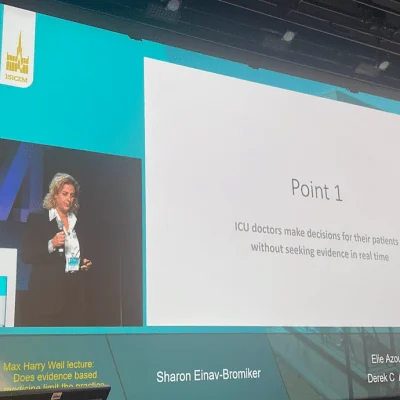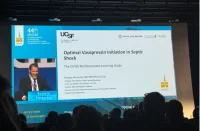Sharon Einav-Bromiker from Tel Aviv, Israel, delivered a thought-provoking session @ISICEM, exploring the conflict between evidence-based medicine and personalised medicine. She acknowledged the complexity of the topic and aimed to challenge conventional perspectives.
While evidence-based medicine provides a sense of certainty, it may not be as reliable as perceived. Reliance on evidence-based medicine might be akin to sitting on a "comfortable couch," implying a false sense of security.
Observational studies have found that during an average ICU round lasting around 3.7 ± 0.92 hours, intensivists make approximately 102.3 ± 25.9 decisions, totalling an estimated 244 ad-hoc decisions per clinician over 24 hours. In contrast, patients make only about nine decisions within the same timeframe. These decisions made by clinicians are mostly event-based, occurring in complex combinations, and do not adhere to a linear process. This pattern does not align with the principles of evidence-based medicine.
There are also challenges associated with accessing reliable evidence in modern medicine. Traditional avenues like PubMed are deemed cumbersome, while Google's reliability is declining due to sponsored content dominating search results. Textbooks face issues with timely updates and physical format in the digital age. UpToDate, a popular resource, focuses on diseases rather than individual patients and updates its content based on perceived importance, raising questions about bias and completeness. Additionally, its reliance on a limited selection of journals raises concerns about the comprehensiveness of its recommendations and the certainty of the information provided. Hence, intensivists face significant challenges accessing and utilising evidence in real-time decision-making.
The notion that clinicians inherently possess all necessary evidence is an assumption marked by several limitations. Guidelines are useful as a baseline but can't always be followed blindly. Meta-analyses, while valuable, are time-consuming and can often be of poor quality. Cochrane Reviews, though authoritative, are limited in scope and may not cover all pertinent topics. Non-Cochrane meta-analyses can also be unreliable due to methodological shortcomings and biases. Thus, several complexities are involved in evidence-based decision-making in critical care settings.
Prof Einav-Bromiker emphasised the intuitive aspect of decision-making in medicine. She highlighted the challenge of replicating evidence in follow-up studies, noting that different population distributions can yield varying results. Better clinical trials can help address the evidence gap, but caution should still be exercised against assumptions and complexities in their execution. She stressed the slow adoption of evidence into practice, noting that meaningful endpoints at the bedside may differ from traditional metrics like mortality.
Overall, there is a need for a more pragmatic approach to evidence-based medicine due to the practical limitations of conducting trials for every medical dilemma encountered in clinical practice. There is no use of the accumulation of trials without a shift in thinking.
Prof Einav-Bromiker expressed cautious optimism about the trajectory of medical practice, emphasising the importance of critical thinking alongside reliance on evidence. She asserted that clinical practice shouldn't be restricted by randomised trials when the evidence doesn't align with intuition. This is because there is a dynamic relationship between evidence and practice. Evidence should be adapted to clinical needs rather than the other way around. There will be an inevitable shift towards individualised medicine facilitated by augmented intelligence. Contrary to the belief that evidence-based medicine may impede personalised medicine, she argued that they complement each other, with evidence providing a framework for personalised approaches.
Source: ISICEM
Image Credit: ISICEM







